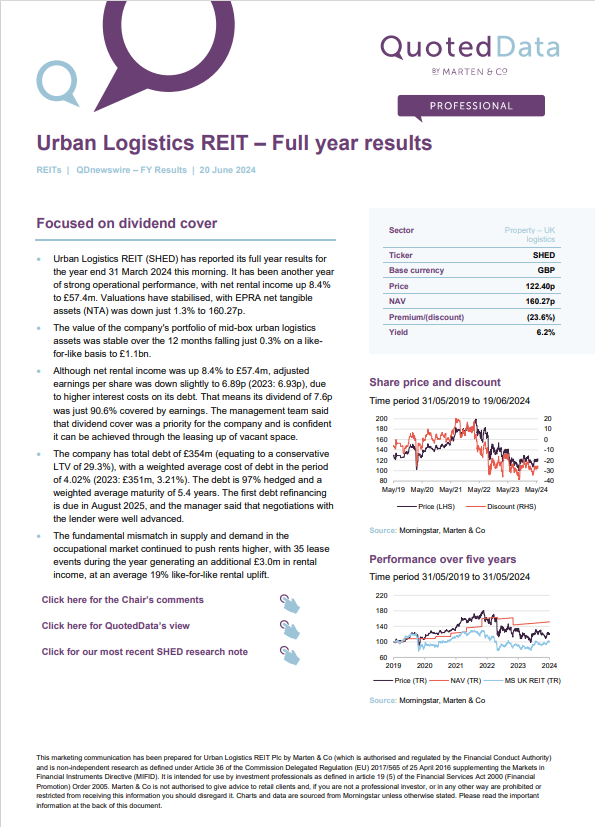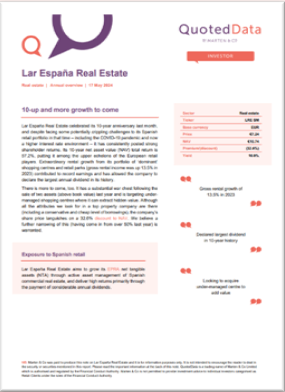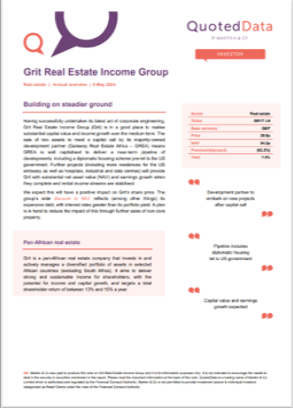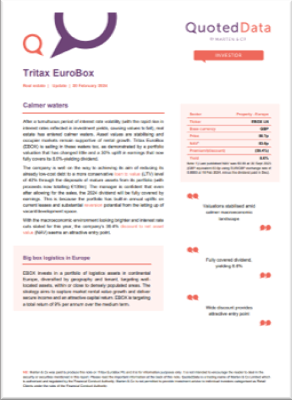July 2024
Winners and losers in June 2024
| Best performing funds in price terms | (%) |
|---|---|
| Harworth Group | 15.6 |
| Tritax EuroBox | 14.3 |
| Workspace | 11.0 |
| Helical | 10.5 |
| Regional REIT | 9.4 |
| NewRiver REIT | 7.7 |
| Residential Secure Income | 5.5 |
| Capital & Regional | 4.2 |
| Custodian Property Income REIT | 3.9 |
| Schroder REIT | 3.5 |
| Worst performing funds in price terms | (%) |
|---|---|
| Safestore Holdings | (14.5) |
| Grit Real Estate Income | (10.0) |
| Alpha Real Trust | (8.4) |
| TR Property | (6.6) |
| British Land | (6.0) |
| Big Yellow Group | (5.9) |
| IWG | (5.3) |
| LondonMetric | (5.3) |
| First Property | (5.2) |
| Land Securities | (5.1) |

Best performing funds
With a general election called and a decision on a possible interest rate cut pushed back, the property sector was again waiting on the sidelines for some positive macroeconomic action. This was reflected in a 1.5% median average fall among the listed property companies. One company that is not waiting on the sidelines is Harworth Group. The developer announced the bellwether sale of development land to Microsoft for a hyperscaler data centre at a huge profit (see page 4). Merger and acquisition (M&A) activity in the sector continues, with European logistics landlord Tritax EuroBox the subject of private equity interest (see page 3). Hopes of a bidding war grew after the company announced it had received further proposals following the initial interest from Brookfield. Beleaguered office owner Regional REIT saw a spike in its share price after being thrown a lifeline through a fully underwritten discounted equity raise (see page 3). Meanwhile, NewRiver REIT was granted extra time to finalise an offer for its small-cap shopping centre peer Capital & Regional. Unusually for merger announcements, the share price of both companies has lifted since the announcement – perhaps reflecting the obvious synergies.

Worst performing funds
On the flip side, self-storage specialist Safestore was in the red after posting a fall in earnings amid tough trading conditions in most of its markets. This followed a rally in its share price in May following the bid for its peer Lok’n Store. Fellow self-storage specialist Big Yellow followed Safestore into negative returns in June. Perhaps reflecting investor attitudes towards the real estate sector whilst interest rates remain elevated, property securities investors TR Property saw its share price drop in the month. The company, which invests in stocks across Europe, reported a 15.2% uplift in NAV in its annual results (see page 2). Similarly, the two property titans British Land and Land Securities were both in negative territory in June. Despite being inducted into the FTSE 100 index, LondonMetric’s share price fell after reporting a drop in NAV in its annual results (see page 2) mainly caused by the one-off costs associated with the merger with LXi REIT. The company is making solid progress in selling off non-core assets at healthy premiums to book value (see page 4 for more detail) and has signalled more M&A activity may be on the cards (see page 6 for the company’s view on the market).

Valuation moves
| Company | Sector | NAV move (%) | Period | Comments |
|---|---|---|---|---|
| Schroder European REIT | Europe | (3.6) | Half-year to 31 Mar 24 | Portfolio valuation declined 3.1% to €208.1m |
| Residential Secure Income | Residential | (5.6) | Half-year to 31 Mar 24 | 2.0% like-for-like decrease in property values to £317m |
| TR Property | Securities | 15.2 | Full year to 31 Mar 24 | NAV total return of 21.1%, out-performing benchmark return of 15.4% |
| Sirius Real Estate | Europe | 1.6 | Full year to 31 Mar 24 | Portfolio valued at €2,210.6m, an uplift of 4.1% |
| Warehouse REIT | Industrial | 1.5 | Full year to 31 Mar 24 | Portfolio value up 2.0% on a like-for-like basis to £810.2m |
| Urban Logistics REIT | Logistics | (1.3) | Full year to 31 Mar 24 | Portfolio valuations on a like-for-like basis down 0.3% to £1,100m |
| LondonMetric | Logistics | (3.6) | Full year to 31 Mar 24 | NAV fall largely due to merger costs. Property value decreased 0.2% |
| Schroder REIT | Diversified | (4.4) | Full year to 31 Mar 24 | Portfolio valuation decline of 2.8% to £459.3m |
| Alpha Real Trust | Debt | (4.4) | Full year to 31 Mar 24 | NAV fall reflects drop in value of investment portfolio (which makes up 26.1% of assets) |
| NewRiver REIT | Retail | (5.0) | Full year to 31 Mar 24 | Decline in portfolio valuation of 2.3% to £544m |
| Custodian Property Income REIT | Diversified | (5.9) | Full year to 31 Mar 24 | 4.0% like-for-like fall in the value of the portfolio to £589.1m |
| Workspace | Offices | (13.7) | Full year to 31 Mar 24 | Like-for-like portfolio valuation down 8.1% to £2,446m |
Corporate activity in June

Tritax EuroBox announced it was in discussions with a number of parties regarding the sale of the company. This followed an approach from Canadian private equity giant Brookfield Asset Management in early June over a possible offer for the company. Brookfield was granted an extension to its deadline to announce a firm intention to make an offer for Tritax EuroBox to 29 July.
London office developer Great Portland Estates raised £350m in a rights issue. The company received acceptances for 96.8% of the total shares offered under the three for five rights issue. The rest were taken up by the sponsors of the issue under their underwriting agreement. GPE will invest the proceeds into office development sites in London. The company has a near-term acquisition pipeline worth £1.4bn within central London, and an additional watchlist worth another £1.4bn.
Regional REIT announced a capital raising of £110.5m through a fully underwritten placing. The company has also announced a 1 for 10 share consolidation. The capital raising, which is being underwritten by Bridgemere Investments, will enable the company to fully repay a £50m retail bond that is due to mature in August. The remainder of the proceeds will be split with £26.3m used to reduce bank facilities and £28.4m to fund selective capital expenditure on assets. As a result, the company’s LTV, which had ballooned to 56.8%, will reduce to 40.6% (on a fresh valuation of the portfolio on 21 June 2024). Following completion of the capital raising, and subject to shareholder approval at an extraordinary general meeting on 18 July, it is proposed that shares in the company will be consolidated at the ratio of one share for every 10 ordinary shares.

Special Opportunities REIT pulled its proposed IPO after falling short of its target fundraise. The company had targeted a £500m raise to acquire commercial property at distressed prices. It had lined up three cornerstone investors for up to £114m, but still fell short of its minimum level of target £250m. It is now thought the management team will look to raise equity in the private market.
Home REIT failed to refinance its loan with Scottish Widows and will now look to sell more of its portfolio to repay the outstanding debt. The company said that extensive discussions with a new potential lender to refinance its debt facility (of just over £100m) fell through. It will repay the outstanding borrowings through further property sales. It will pay a higher additional interest fee on the outstanding amount (of 7% per annum up from 5%). After repaying the debt with proceeds of property sales, the company will be left with a portfolio worth around £200m.
Balanced Commercial Property Trust updated on its strategic review, stating that it had received interest from a number of parties to buy the company. It added that there can be no certainty that any proposal would merit a board recommendation. The company is also considering other options such as a managed wind down.
As expected and recommended by its board, shareholders of abrdn European Logistics Income voted against its continuation at its AGM. The company will now be put into a managed wind down.

June’s major news stories – from our website
- Harworth sells development land to Microsoft for hyperscale data centre
Harworth Group sold a parcel of land near Leeds to Microsoft for £106.6m for the development of a hyperscale data centre. The 48 acres of land at Harworth’s Skelton Grange site will be sold in two phases and are expected to deliver an internal rate of return (IRR) of over 40%.
- SEGRO goes Dutch with €222m triple buy
SEGRO acquired three fully leased logistics warehouses in The Netherlands for €222m. The assets, located in Eindhoven, Heerlen, and Tilburg, total 172,300 sqm and generate €10m of rent, equating to a blended net initial yield of 4.6%.
- Land Securities increases stake in Bluewater shopping centre
Land Securities acquired an additional 17.5% stake in Bluewater shopping centre from GIC for £120m, increasing its ownership to 66.25%. The acquisition increases the company’s net rental income by £10.3m. The purchase was in line with its objective to grow its investment in major retail destinations, recycling capital from its recent non-core disposals.
- Warehouse REIT ventures into retail parks with £38.6m buy
Warehouse REIT acquired phase 2 of Ventura Retail Park for £38.6m, venturing away from its core investment strategy. The 13-unit scheme in Tamworth, close to Birmingham, was bought at a net initial yield of 7.4%. The company said the acquisition should support earnings and help rebuild dividend cover.
- Target Healthcare REIT sells four care homes at book value
Target Healthcare REIT completed the disposal of four UK care homes for £44.5m at a modest premium to the book value at 31 March 2024. Proceeds will be used to repay debt.
- Home REIT flogs more properties at auction
Home REIT sold a further 133 properties at auction for £11.36m. These were 7.8% below the draft August 2023 valuations. Since August 2023, the company has completed on the sale of 774 properties and exchanged on a further 205 properties, for gross proceeds of £137.0m.
- Sirius Real Estate grows UK portfolio
Sirius Real Estate completed the acquisitions of two industrial assets in the UK, in Banbury and Wembley, for just over £31m, representing a 9.2% net initial yield. The acquisitions add 492,000 sq ft of space to the group’s UK portfolio.
- CLS Holdings to convert Paris office in apartments
CLS Holdings announced that it will convert its office property Debussy, in Paris, into serviced apartments. It will invest €12m over a two-year period to convert the existing office building into 57 serviced apartments, which will be operated by Edgar Suites, an aparthotels operator, on a 12-year lease with a base rent and a turnover element.
- Triple Point Social Housing REIT sells £20m portfolio
Triple Point Social Housing REIT agreed on the sale of a portfolio of assets for more than £20m. The company said the portfolio was representative of its wider portfolio. The sale is expected to complete before September.
- LondonMetric offloads Scottish offices
LondonMetric Property sold two offices in Scotland to a single buyer for £36.6m, reflecting a blended net initial yield of 7.0%. The sales are former LXi assets and comprise an 85,000 sq ft office in Dundee let to BT and a 60,000 sq ft office in Glasgow let to STV Plc. LondonMetric has now sold £55.4m of non-core LXi assets, 7% above book values.
Managers views
A collation of recent insights on real estate sectors taken from the comments made by chairmen and investment managers of real estate companies – have a read and make your own minds up. Please remember that nothing in this note is designed to encourage you to buy or sell any of the companies mentioned.

Securities
TR Property – Kate Bolsover, chairman:
Investor behaviour continues to be governed by the trajectory of bond yields and inflation. This is particularly acute in leveraged asset classes such as real estate. Compared to the two previous years, when we witnessed seemingly relentless incremental increases in base rates, this period was marked by a more positive shift in sentiment, as investors began to sense a peak in the interest rate cycle. Nevertheless, our manager had to navigate a series of false dawns as markets rallied on expectations of more dovish central bank behaviour – before this more buoyant mood was proved to be premature. Whilst the second half of the year under review saw much greater volatility in share prices, we also sense increasing engagement from investors in our corner of the equity market, as the weakening of inflationary pressures becomes increasingly evident – particularly across Europe.
Our manager’s central case is that we are now closer (than in previous reports) to the peak of this interest rate cycle in Europe. The multiple ‘false dawns’ (where shares prices rallied in anticipation of interest rate cuts, only to fall back) have weighed on sentiment and many investors remain on the sidelines awaiting hard evidence of base rates falling. Also importantly, the manager’s positive viewpoint is not predicated on substantial reductions in interest rates. What is being looked for is stability in the monetary environment with lenders returning and margins normalising.

Retail
NewRiver REIT – Allan Lockhart, chief executive:
The retail sector over the last seven years or so has had to navigate significant challenges but in our opinion is arguably in its best position for several years, this is for three reasons. Firstly, much of the corporate restructuring in the retail sector has already taken place, as evidenced by the significant number of CVAs and tenant administrations occurring between 2020 and 2022. As a result, many of the weaker retailers have been removed and, with that, the excess competition benefitting the rest of the market.
Secondly, most national retailers have applied a laser focus on margin growth over the last ten years, not just volume growth, by delivering improved operational efficiency, including portfolio repositioning. This has led to improved financial results, and a great example of this is Marks & Spencer.
Thirdly, omnichannel retailers are gaining market share from pure play online retailers. Omnichannel retailers have invested in fully integrating their physical store network with their online channel, and their digital capability in communicating and transacting with their customers. This is positive for our sector as the physical store is at the centre of omnichannel retailing, reflecting that physical stores are the genuine last mile fulfilment and a business-critical channel for retail today and into the future.
Last year, the capital markets continued to be influenced by the elevated risk-free rate, increasing debt costs and the de-risking of defined benefit pension schemes, all of which contributed to a subdued transactional market and capital raising. This has persisted in the first half of 2024, as investors wait for more evidence of pricing adjustment before they deploy more capital. Recent positive news on inflation and the corresponding impact for the future direction of interest rates may lead to a pickup in investor sentiment in the second half of 2024.
In line with the wider real estate market, transactional volumes were down for both retail parks and shopping centres. That said, we have recently seen an increase in investor demand for retail parks driven by the highly favourable supply demand imbalance which will lead to consistent rental growth. Investor demand for shopping centres has also recently improved, with multiple bids being received for recently available shopping centres, attracted by the high cash-on-cash returns on offer.

Logistics
LondonMetric – Andrew Jones, chief executive:
As has been the case for a while, the future path of interest rates has been the main driver of market sentiment. Central banks continue to play a delicate balancing act of keeping inflation in check without stifling growth and, whilst current economic data suggests that the global economy is far healthier than some perceive, we expect central banks to start cutting rates this summer. Usually these two factors are mutually contradictory conditions.
For the UK, we have a resilient economy with no imminent threat of a recession. However, growth has proven more elusive and has essentially flatlined with unemployment and inactivity rates rising. Whilst interest rate increases are now having the desired impact of dampening inflation (CPI of 2.3% at the last print compared to 9-10% a year ago), service sector inflation and wage growth remain high which may temper the number of rate reductions this year.
Whilst the cost of living in the UK is undoubtedly impacting the consumer and consumer confidence remains cautious, we believe that it is well positioned to navigate the current economic climate, helped by low unemployment levels, good savings ratios, strong wage growth and lower household budget inflation (particularly with energy prices falling back).
Interest rates remain the yardstick by which our assets are valued. Whilst liquidity for real estate has improved, the property market remains a long way from functioning normally as evidenced by the 30% decline in transactional activities in 2023 and subdued activity so far this year.
Elevated interest rates and swap rates are effectively ruling out the debt buyers and we remain of the view that normal liquidity won’t return until five year swap rates fall materially towards 300bps.
For high growth real estate sectors, liquidity is much improved, with good volumes for smaller lot sizes where debt is not required. The logistics sector has been one of the few sectors transacting helped by more assured income security and rental growth.
For lower growth real estate sectors such as offices and shopping centres, there remains a gulf in buyer and seller expectations. Whilst the values of some of these assets have fallen 60%+ and greater pricing realism has crept into valuations there still appears to be further to go. We are also now operating in a new paradigm where, if the property market won’t offer price discovery, then the debt market inevitably will.
There is a significant amount of debt expiring and loans to be refinanced over the coming years. The overall property market remains over-leveraged or under-equitised and the banks are becoming increasingly active in forcing assets to the market. Refinancings are exposing proper price transparency and highlighting to owners and debt providers that assets that once yielded a positive carry and attractive cash on cash metrics are now seeing equity holders being wiped out and lenders taking a loss. This is particularly acute in parts of the office sector.
The UK listed sector remains in a much better place to ride out the current higher rate environment than the private sector or indeed many of the European REITs, where leverage is materially higher. Many of the lessons learned from the global financial crisis were forgotten, but, in the UK, lower leverage was not one of them.
However, that is not to say the UK listed space isn’t without its issues. Legacy investment strategies and poor structures have been exposed. When debt was free, REIT investing seemed like a one-way bet. However, as interest rates have normalised, portfolio quality, debt management, management alignment and liquidity have come sharply into focus.
Whilst we have already seen some sector consolidation there are still a number of listed REITs who are no longer ‘fit for purpose’. More often, these are small cap, externally managed with limited sectoral focus and little shareholder alignment of interest.
We continue to believe that the market will offer up further opportunities for consolidation and that as confidence returns, we believe that public real estate can once again grow. After all, boards have a duty of care to the shareholders and investors deserve scalable and efficient structures that provide opportunities for them to deploy their significant sums of capital.
Urban Logistics REIT – Richard Moffitt, chief executive:
The two halves of the period under review were characterised by markedly different conditions. In the first half, uncertainty levels remained high with a lack of clarity on the likely trajectory for both interest rates and inflation. Towards the end of the second half of the year, confidence improved thanks to strengthening macro-economic conditions.
The macro-economic conditions are never possible to predict with any accuracy; however, the consensus among economists would suggest that the year to March 2025 would see reductions in interest rates, which all other things being equal, would be positive for asset values and the listed real estate space.

Europe
Schroder European REIT – Jeff O’Dwyer, fund manager:
The Eurozone is starting to see signs of cautious optimism. With inflation easing, the European Central Bank in early June has reduced rates by 25 basis points. The market is expecting a further decline towards the end of 2024 which will further help sentiment. Despite this, economic growth is forecast to remain moderate over the short term. Geopolitical risks in Ukraine and the Middle East continue to be the primary risk impacting broader capital markets.
The real estate occupational markets present a mixed picture. Select retail and industrial investments are seeing positive take-up and rental growth, while offices are increasingly characterised by a growing polarisation between highly accessible offices with favourable sustainability credentials witnessing better demand and rental growth over older, secondary-located office stock.
The investment market remains subdued with transactional activity biased to sub €30m lot sizes, consistent with the company’s strategy. Pricing appears to have stabilised across select retail and industrial with secondary offices expected to see further valuation pressures, particularly as valuers price sustainability risks.
Sustainability is set to have a growing impact on decision-making across all sectors. Market participants are actively striving to align themselves with environmental, social, and governance (ESG) agendas. Additionally, there is a heightened focus on obtaining improved data regarding the costs and benefits associated with sustainability choices.

Residential
Residential Secure Income – Rob Whiteman, chairman:
Despite the headwinds to valuations caused by higher interest rates, the fundamentals underpinning [the sector] are positive – backed by rising demand for affordable housing and with a substantial opportunity to drive strong operating performance.
Retirement living is a key solution to tackle the social isolation that increasingly impacts a UK population that is rapidly ageing, with the demographic over 65 expected to increase by almost 50% by 2060. Shared ownership provides affordable homeownership in an environment where most of the UK population lives in areas where home purchase is unaffordable. This is underpinned by an environment where the UK has consistently fallen short of the government’s aspiration for 300,000 new homes per year with an estimated need for £34bn of annual investment over the next decade to begin addressing the shortfall.

Diversified
Custodian Property Income REIT – Richard Shepherd-Cross, invetsment manager:
The year to 31 March 2024 has felt like a turning point in the UK commercial property market. Data shows the industrial and logistics sector has shown modest capital value growth and consistent rental growth month on month. While retail and office values have fallen, month on month falls have been at a decreasing rate, with retail moving back into growth in March 2024. This return to growth was led by retail warehousing. Data reported by CBRE highlights this slowing of valuation falls, recording all property capital values decreasing by 3.9% in the 12 months to December 2023, but falling by just 0.4% in the three months to March 2024 and only 0.1% in the month of March 2024.
The first green shoots of investor confidence showed in early 2024, rooted in an expectation of falling interest rates and an acknowledgement that, in many sectors of the property market, valuations had adjusted sufficiently to reflect investor sentiment. However, the early part of 2024 witnessed an increase in the five year swap rate, and a hiatus in the improving inflation statistics. These factors may have delayed a recovery, but a recovery is still expected over the next 12 months as inflation settles and interest rate decreases follow.
Schroder REIT – Nick Montgomery, fund manager:
Given lower debt levels compared with past cycles, institutional investors are arguably more focused on the spread real estate offers over the risk-free rate, or the ten-year gilt. The MSCI Benchmark average net initial yield is now 5.2%, which compares with the net initial yield on the Company’s underlying portfolio of 6.1%. This is the highest MSCI Benchmark net initial yield since 2014 and represents a premium of 1.0% over the prevailing 10-year gilt rate of 4.2%.
This is below the long-term premium of approximately 1.5% to 2%, indicating a further increase in real estate yields, or a fall in gilt yields, might be required for the sector to represent ‘fair value’. However, this ignores the positive impact of rental growth on total returns, and in this respect the market is better placed now than in recent cyclical recoveries. For example, average nominal rents are now 6.6% higher than in June 2022, which compares with 3.4% lower over the equivalent 21-month period post-GFC. More materially, average industrial rents are now 12.9% higher than in June 2022, which compares with 0.1% post GFC. This performance illustrates both the structural factors that are driving demand for real estate in a market with relatively low levels of new supply, as well as the inflation-hedging quality of rental income.
Against this backdrop, market expectations that interest rates are peaking will be key to a recovery in sentiment towards real estate, together with increased availability of bank debt and reduced selling out of open-ended property funds.
The most significant and positive feature of the market is the above-average level of nominal rental growth, particularly for more structurally supported sectors such as industrial, retail warehousing, prime offices, and operational assets such as residential, self-storage and hotels. This rental growth, together with the potential for a future yield rerating, should going forward deliver total returns above the long run average, and lead to capital flows back to the sector.
Real estate research notes


A result analysis note on Urban Logistics REIT (SHED). The company reported resilient performance in a rising interest rate environment, with its focus on growing earnings to provide dividend cover.

An annual overview note on Lar España Real Estate (LRE SM). Impressive rental growth allowed the company to declared the largest dividend in its 10-year history.



An annual overview note on Grit Real Estate Income Group (GR1T). Its latest act of corporate engineering has opened the door for new NAV and earnings accretive developments.

An update note on Tritax EuroBox (EBOX), which is sailing in calmer waters as demonstrated by a portfolio valuation that has changed little and a 30% uplift in earnings that now fully covers its 8.6%-yielding dividend.

IMPORTANT INFORMATION
This note was prepared by Marten & Co (which is authorised and regulated by the Financial Conduct Authority).
This note is for information purposes only and is not intended to encourage the reader to deal in the security or securities mentioned within it. Marten & Co is not authorised to give advice to retail clients. The note does not have regard to the specific investment objectives, financial situation and needs of any specific person who may receive it.
Marten & Co may have or may be seeking a contractual relationship with any of the securities mentioned within the note for activities including the provision of sponsored research, investor access or fundraising services.
This note has been compiled from publicly available information. This note is not directed at any person in any jurisdiction where (by reason of that person’s nationality, residence or otherwise) the publication or availability of this note is prohibited.
Accuracy of Content: Whilst Marten & Co uses reasonable efforts to obtain information from sources which we believe to be reliable and to ensure that the information in this note is up to date and accurate, we make no representation or warranty that the information contained in this note is accurate, reliable or complete. The information contained in this note is provided by Marten & Co for personal use and information purposes generally. You are solely liable for any use you may make of this information. The information is inherently subject to change without notice and may become outdated. You, therefore, should verify any information obtained from this note before you use it.
No Advice: Nothing contained in this note constitutes or should be construed to constitute investment, legal, tax or other advice.
No Representation or Warranty: No representation, warranty or guarantee of any kind, express or implied is given by Marten & Co in respect of any information contained on this note.
Exclusion of Liability: To the fullest extent allowed by law, Marten & Co shall not be liable for any direct or indirect losses, damages, costs or expenses incurred or suffered by you arising out or in connection with the access to, use of or reliance on any information contained on this note. In no circumstance shall Marten & Co and its employees have any liability for consequential or special damages.
Governing Law and Jurisdiction: These terms and conditions and all matters connected with them, are governed by the laws of England and Wales and shall be subject to the exclusive jurisdiction of the English courts. If you access this note from outside the UK, you are responsible for ensuring compliance with any local laws relating to access.
No information contained in this note shall form the basis of, or be relied upon in connection with, any offer or commitment whatsoever in any jurisdiction.